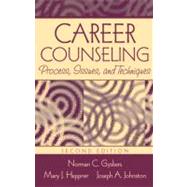
| Preface | xi | ||||
| Acknowledgments | xv | ||||
| PART I Career Counseling in the 21st Century: Evolving Contexts, Challenges, and Concepts | |||||
|
1 | (18) | |||
|
2 | (5) | |||
|
7 | (5) | |||
|
12 | (3) | |||
|
15 | (1) | |||
|
16 | (3) | |||
|
19 | (31) | |||
|
22 | (17) | |||
|
39 | (8) | |||
|
47 | (1) | |||
|
47 | (3) | |||
|
50 | (27) | |||
|
|||||
|
51 | (1) | |||
|
52 | (5) | |||
|
57 | (3) | |||
|
60 | (7) | |||
|
67 | (4) | |||
|
71 | (6) | |||
|
77 | (37) | |||
|
78 | (2) | |||
|
80 | (2) | |||
|
82 | (2) | |||
|
84 | (6) | |||
|
90 | (3) | |||
|
93 | (10) | |||
|
103 | (5) | |||
|
108 | (6) | |||
|
114 | (25) | |||
|
116 | (1) | |||
|
117 | (1) | |||
|
118 | (1) | |||
|
119 | (2) | |||
|
121 | (5) | |||
|
126 | (3) | |||
|
129 | (7) | |||
|
136 | (3) | |||
|
139 | (15) | |||
|
|||||
|
140 | (1) | |||
|
140 | (2) | |||
|
142 | (3) | |||
|
145 | (1) | |||
|
146 | (5) | |||
|
151 | (1) | |||
|
152 | (2) | |||
|
154 | (17) | |||
|
155 | (3) | |||
|
158 | (4) | |||
|
162 | (5) | |||
|
167 | (1) | |||
|
168 | (1) | |||
|
168 | (3) | |||
| PART II Opening and Gathering Information Phases of the Career Counseling Process: Selected Techniques and Instruments | |||||
|
171 | (8) | |||
|
171 | (3) | |||
|
174 | (2) | |||
|
176 | (1) | |||
|
177 | (2) | |||
|
179 | (22) | |||
|
180 | (2) | |||
|
182 | (14) | |||
|
196 | (3) | |||
|
199 | (1) | |||
|
200 | (1) | |||
|
201 | (15) | |||
|
203 | (1) | |||
|
203 | (6) | |||
|
209 | (2) | |||
|
211 | (3) | |||
|
214 | (1) | |||
|
214 | (2) | |||
|
216 | (20) | |||
|
217 | (3) | |||
|
220 | (2) | |||
|
222 | (11) | |||
|
233 | (2) | |||
|
235 | (1) | |||
|
236 | (28) | |||
|
236 | (2) | |||
|
238 | (4) | |||
|
242 | (1) | |||
|
242 | (6) | |||
|
248 | (14) | |||
|
262 | (1) | |||
|
262 | (2) | |||
|
264 | (19) | |||
|
266 | (15) | |||
|
281 | (2) | |||
| PART III Understanding and Interpreting Client Information and Forming Hypotheses Phases of the Career Counseling Process | |||||
|
283 | (27) | |||
|
285 | (3) | |||
|
288 | (1) | |||
|
289 | (1) | |||
|
290 | (5) | |||
|
295 | (8) | |||
|
303 | (5) | |||
|
308 | (1) | |||
|
308 | (2) | |||
|
310 | (21) | |||
|
312 | (8) | |||
|
320 | (8) | |||
|
328 | (1) | |||
|
328 | (1) | |||
|
329 | (2) | |||
| PART IV Taking Action, Using Information, Developing Career Goals and Plans of Action, Evaluating Results, and Closing the Relationship Phases of the Career Counseling Process | |||||
|
331 | (17) | |||
|
332 | (2) | |||
|
334 | (1) | |||
|
334 | (2) | |||
|
336 | (1) | |||
|
337 | (2) | |||
|
339 | (1) | |||
|
339 | (1) | |||
|
340 | (7) | |||
|
347 | (1) | |||
|
348 | (10) | |||
|
348 | (3) | |||
|
351 | (1) | |||
|
351 | (2) | |||
|
353 | (4) | |||
|
357 | (1) | |||
|
358 | (13) | |||
|
359 | (2) | |||
|
361 | (2) | |||
|
363 | (1) | |||
|
363 | (1) | |||
|
364 | (5) | |||
|
369 | (2) | |||
| Index | 371 |
The New copy of this book will include any supplemental materials advertised. Please check the title of the book to determine if it should include any access cards, study guides, lab manuals, CDs, etc.
The Used, Rental and eBook copies of this book are not guaranteed to include any supplemental materials. Typically, only the book itself is included. This is true even if the title states it includes any access cards, study guides, lab manuals, CDs, etc.